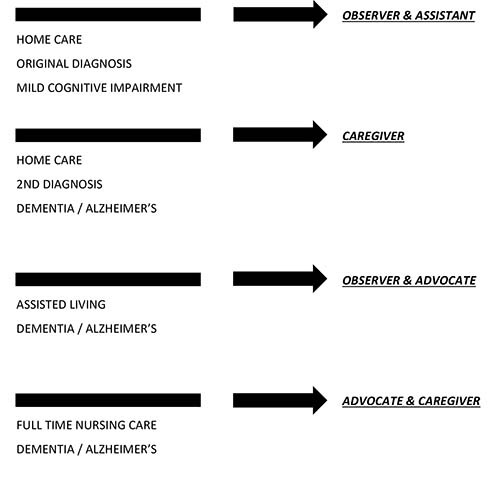Lamy Center Caregiver Connection: Transition: The Journey from Caregiver to Advocate
Written By: Rudi Lamy, MLS, MAS, Consultant to the Peter Lamy Center on Drug Therapy and Aging
The Caregiver Connection blog is back! Welcome to the Year of the Tiger in the Chinese Zodiac. People born in a year of the tiger are predicted to be brave, competitive, unpredictable, confident, and display great levels of willpower. I shall try to meet that standard this year.
Advocate: a person who assists, defends, pleads, or prosecutes for another.*
Advocacy: the work or profession of an advocate; the act of pleading for or actively supporting a cause or proposal.* (Black’s Law Dictionary, 7th ed. West Group, 1999)
Caregiver Becomes Advocate
According to the Alzheimer’s Society of Manitoba, “People with dementia often become unable to express their needs or make their wishes known … Being an advocate is a skill that involves problem solving, lots of communication and often persistence.”
I’ve tried my hand at being differing kinds of caregiver. All my original efforts were, to start, home-based. I was at first an assistant and then an observer. My “patient” was ambulatory and still in command of the greatest part of her cognitive abilities. Next, my work became that of a hands-on caregiver for a decade at home, taking care of all those things that needed caring for: physical, emotional, financial, and medical.
My responsibilities changed once my wife moved to assisted living, then changed again as she moved into full-time nursing care. In assisted living, caregiving was done by staff. I was an observer and advocate but also served as secretary and chauffeur.
This progression is strictly my personal path. Everyone who lives and works with dementia will have their own personal path. Many things will influence your journey: age, health, type of dementia. In my case, I now serve as both advocate and caregiver. For example, there are decisions to be made after a fall at 3 a.m. Or helping with eating, examination of toenails, and rashes. Or nagging the staff when glasses go missing.
In any event, perhaps getting involved with a support group or reading professional and para-professional materials can provide you with helpful information.
You can ask me questions through the blog comments section. You can find me on Facebook. You can speak with your neurologist or psychiatrist. You might even start by reading some of the following resources. Don’t forget to check their bibliographies too!
Be well and thanks for reading,
Rudi
Suggested Readings:
- Alzheimer’s Society of Manitoba: Dementia Care & Brain Health. Factsheet 1: What is an Advocate? (2014). Alzheimer.mb.ca
- Social Care Wales. “Advocacy in dementia care.” https://socialcare.wales/service-improvement/advocacy-in-dementia-care
- Trivedi, S.; Beckett, S.; Dick, A. et al. “Safer transitions in the care of the Elderly: Identification of Essential information in transitional care.” Canadian Jrnl of Emergency Medicine 21, pp S110-S111 (2019).
- Akn, B. “Perception and opinion of nursing faculties regarding advocacy role: a qualitative research.” Nursing Forum 55(4), (2020); pp 637-644.
- Petriceks, A.H.; Kumar, A.; Schwartz, A.W. “The Urgency of now: Opportunities for advocacy among geriatrics health professionals and trainees.” Jrnl of Amer Geriatrics Society 69(9) (2021); pp. 2445-2448.
- Hu, W.T. “No doubts about dementia advocacy.” The Lancet Psychiatry 4(11) (2017); p. 830
- Bangerter, L.R.; Heid, A.R.; Van Haitsma, K. “Honoring the everyday preferences of nursing home residents: Perceived choice and satisfaction with care.” The Gerontologist 57(3) (2017); pp. 479-486.
- Fetherstonhaugh, D.; Rayner, J.A.; et al. “You become their advocate: the experiences of family carers as advocates for older people with dementia living in residential aged care.” Jrnl of Clin Nursing. 30(5-6) (2021). Pp. 676-686.
References:
- Hugo, C.; Dwonczyk, M; et al. “Improving the quality of life of aged care residents through the joy of food: The Lantern Project.” Australian Jrnl on Ageing. 37(4) (2018. Pp. 300-304
- “Being an advocate for your loved one.” http://www.caregiverslibrary.org/Caregivers-Resources/GRP-Medical-…
- “How to be an effective advocate for aging parents.” https://www.aarp.org/caregiving/basics/info-2020/advocate-for-aging-…
- Schein, C. “The hospital stay: 8 steps to advocate for your loved one living with dementia” Aegis Living (2022). https://www.aegosliving.com/resource-center/advocate-for-your-loved-…
- Bergman, C.; et al “Recommendations for welcoming back nursing home visitors during the COVID-19 Pandemic: Results of a Delphi Panel.” Jrnl Amer Medical Directors Assoc 21(12) (2020) pp. 1759-1766.



Good morning, Rudi,
Thanks for the very thoughtful piece. I appreciate your personal insights. And I especially appreciate the robust bibliography offered at the end of the write-up. That will be helpful for a very long time.
With appreciation, CindyH
Rudi- Well-written and informative as usual- EXCELLENT Bibliography. Your personal touch/ experience always add to your articles.